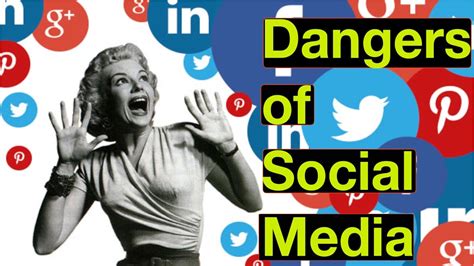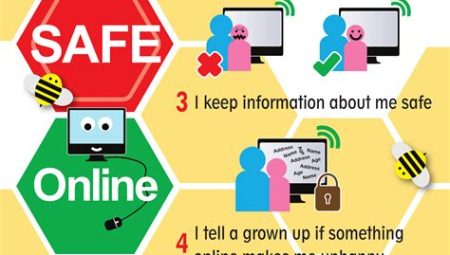In today’s digital age, social media has become an integral part of our daily lives. From staying connected with loved ones to being informed about the latest news and trends, it’s hard to imagine a world without it. However, what many people fail to realize are the hidden dangers that come with excessive social media use. In this blog post, we will delve into the impact of social media on mental health, self-esteem, and overall well-being. We will also discuss the prevalence of cyberbullying, the fear of missing out phenomenon, sleep disruptions, digital addiction, privacy concerns, unrealistic expectations, wasted time, and the threat of online predators. It’s important to be informed and aware of these potential dangers in order to safeguard ourselves and our loved ones from the negative effects of social media. So, buckle up and get ready to explore the darker side of social media that often goes unnoticed.
Table of Contents
Impact on Mental Health: Recognizing the Signs
Social media and digital technology have revolutionized the way we communicate and connect with others. However, there is a growing concern about the impact of these platforms on our mental health. The constant exposure to curated and often unrealistic portrayals of life can take a toll on our well-being, and it’s important to recognize the signs of mental health issues that may be linked to our online activities.
One of the key signs to watch out for is increased anxiety and stress. The pressure to keep up with the online image of a perfect life can lead to feelings of inadequacy and anxiety. Constant comparison with others’ highlight reels can create a sense of perpetual dissatisfaction with one’s own life.
Another important indicator is a decline in self-esteem. The relentless pursuit of likes and validation can lead to a diminished sense of self-worth. The need for external approval from online interactions can significantly impact one’s self-esteem and overall mental well-being.
In addition, excessive use of social media and digital devices can also lead to depression. The isolation and disconnection from real, meaningful interactions can exacerbate feelings of loneliness and sadness, potentially leading to depressive symptoms.
Social Media and Self-esteem: The Dangerous Connection
In today’s digital age, social media has become an integral part of our daily lives. With the rise of platforms such as Instagram, Facebook, and Twitter, we are constantly bombarded with images and updates from our peers. This constant exposure to curated and often filtered images can have a detrimental impact on our self-esteem.
Scrolling through social media, it’s easy to fall into the trap of comparing ourselves to the seemingly perfect lives of others. This can lead to feelings of inadequacy and a distorted perception of reality. The pressure to present an idealized version of ourselves online can also take a toll on our mental well-being.
Research has shown a strong correlation between heavy social media use and low self-esteem. The need for validation through likes and comments can create a cycle of seeking external approval to feel worthy. This can lead to a negative self-image and a constant need for affirmation from others.
It’s important to recognize the dangers of this connection and take steps to protect our mental health. Limiting our social media consumption, curating our feeds to include positive and inspiring content, and practicing self-love and acceptance are essential in combating the detrimental effects of social media on our self-esteem.
Cyberbullying: Identifying and Addressing the Threat
Cyberbullying is a serious issue that can have devastating effects on individuals, particularly young people. It involves the use of technology, such as social media, messaging apps, and online forums, to harass, intimidate, or humiliate others. Unlike traditional bullying, cyberbullying can happen at any time and in any place, making it difficult for victims to escape. This type of bullying can take many forms, including spreading rumors, sharing personal information without consent, or posting hurtful comments or photos.
It is important to recognize the signs of cyberbullying so that it can be addressed and stopped. Some common signs of cyberbullying include changes in behavior, reluctance to go online, withdrawal from social activities, or a decline in academic performance. If you suspect that someone you know is being cyberbullied, it is essential to offer support and seek help from a trusted adult or mental health professional.
In order to address the threat of cyberbullying, it is crucial to take measures to prevent it from happening in the first place. This includes educating young people about the impact of cyberbullying and the importance of treating others with respect online. Additionally, creating safe and supportive online environments, where individuals feel comfortable reporting instances of cyberbullying, can help to prevent and address the threat.
Cyberbullying is a serious issue that requires a collective effort to address and prevent. By recognizing the signs of cyberbullying, offering support to those who are affected, and taking steps to create a safer online community, we can work towards mitigating the threat of cyberbullying and promoting a more positive and inclusive online experience.
The FOMO Phenomenon: Fear of Missing Out
In today’s digital age, the FOMO phenomenon has become increasingly pervasive, impacting the mental health of individuals across the globe. With the rise of social media platforms and instant access to curated lifestyles, many individuals experience a constant sense of anxiety and inadequacy stemming from the fear of missing out on experiences or opportunities. This phenomenon can lead to heightened stress levels and overall dissatisfaction with one’s own life.
Furthermore, the FOMO phenomenon has been linked to sleep disruptions, as individuals often find themselves scrolling through social media feeds late into the night in a bid to stay connected and avoid missing out. This can have detrimental effects on overall well-being and cognitive function, as lack of quality sleep is associated with a myriad of health issues.
It is crucial for individuals to recognize the signs of FOMO and take proactive steps to mitigate its impact. Practicing mindfulness, limiting social media usage, and engaging in activities that bring genuine joy and fulfillment can help individuals combat the sense of anxiety and comparison that often accompanies the fear of missing out.
Ultimately, understanding and addressing the FOMO phenomenon is essential for promoting mental well-being and fostering a healthier relationship with social media and digital connectivity.
Sleep Disruptions: Unveiling the Effects of Social Media
Social media has become an integral part of our daily lives, playing a significant role in how we communicate, connect, and consume information. However, the impact of social media on our sleep patterns is often overlooked. The use of social media before bedtime has been linked to sleep disruptions, leading to a range of negative effects on our overall health and well-being.
Studies have shown that the blue light emitted from screens of electronic devices such as smartphones, tablets, and computers can interfere with the body’s natural production of melatonin, the hormone that regulates sleep-wake cycles. This disruption can make it more difficult to fall asleep, resulting in reduced overall sleep time and poorer sleep quality.
Furthermore, the content consumed on social media can also contribute to sleep disruptions. Whether it’s engaging with stimulating or distressing content, the emotional arousal caused by social media interactions can make it harder to unwind and relax before bedtime, further impacting our ability to achieve restful sleep.
It’s important for individuals to recognize the effects of social media on their sleep patterns and take proactive steps to mitigate these disruptions. Setting digital boundaries, such as implementing screen-free periods before bedtime, can help reduce the exposure to blue light and emotionally arousing content, promoting better sleep hygiene and overall well-being.
Digital Addiction: Escaping the Social Media Spiral
In today’s digital age, it’s easy to fall into the trap of digital addiction. With the constant presence of social media platforms, it’s no wonder that many people find themselves spending excessive amounts of time scrolling through their feeds, checking for notifications, and seeking validation through likes and comments.
This addiction can have serious consequences on our mental and emotional well-being. It can lead to feelings of anxiety, depression, and low self-esteem as we compare our lives to the highlight reels of others.
Escaping the social media spiral may seem daunting, but it’s not impossible. By setting boundaries for yourself, such as limiting your screen time, unfollowing accounts that trigger negative emotions, and finding alternative activities to engage in, you can slowly break free from the hold that social media has on you.
Ultimately, it’s important to remember that your worth is not determined by the number of likes or followers you have. By taking control of your digital consumption, you can reclaim your time and prioritize your mental health.
Privacy Concerns: Keeping Your Personal Information Safe
In today’s digital age, it has become increasingly important to protect our personal information from potential threats. With the rise of social media and online platforms, there is a growing concern for privacy and data security. It is crucial to be aware of the potential risks and take necessary precautions to safeguard our personal information.
Identity theft is one of the major risks associated with online privacy concerns. Cybercriminals are constantly looking for opportunities to steal personal information such as social security numbers, bank account details, and passwords. This information can be used for fraudulent activities, leading to financial loss and damage to one’s reputation.
One way to protect personal information is to be cautious about sharing details on social media platforms. Avoid sharing sensitive information such as your home address, phone number, or financial details on public profiles. Additionally, it is important to regularly review privacy settings on social media accounts and adjust them to limit the visibility of personal information to only trusted individuals.
Another important aspect of keeping personal information safe is to use strong and unique passwords for online accounts. Avoid using simple or easily guessable passwords, and consider using a password manager to securely store and manage passwords for various accounts. It is also advisable to enable two-factor authentication whenever possible to add an extra layer of security.
Unrealistic Expectations: The Illusion of Perfection
Social media has created a culture of comparing ourselves to others, leading to unrealistic expectations and the constant pursuit of perfection. We are bombarded with images of flawless influencers, perfect bodies, and seemingly ideal lifestyles, all of which can create a sense of inadequacy and dissatisfaction with our own lives. The pressure to live up to these standards can have a detrimental impact on our mental well-being and self-esteem.
It’s important to recognize that what we see on social media is often an illusion. People tend to present only the best parts of their lives, and often use filters and editing tools to enhance their appearance. This can create a distorted perception of reality and contribute to feelings of inadequacy and unworthiness.
As a result, many individuals may develop anxiety, depression, or other mental health issues as they strive to meet these unattainable standards. It’s crucial to acknowledge the damaging effects of comparing ourselves to unrealistic ideals and to shift our focus towards self-acceptance and personal growth.
By understanding the illusion of perfection perpetuated by social media and other societal pressures, we can begin to challenge these unattainable standards and embrace our true selves. It’s essential to cultivate a mindset of self-love and acceptance, rather than striving for an unachievable ideal of perfection.
Time Wasted: The Negative Impact on Productivity
In today’s digital age, it is easy to get caught up in the endless scroll of social media and online entertainment. Hours can slip away without even realizing it, resulting in a significant impact on productivity. The time wasted on these platforms can have a detrimental effect on both personal and professional productivity.
When individuals spend excessive amounts of time on social media, they are often neglecting other important tasks such as work or personal responsibilities. This can lead to missed deadlines, decreased quality of work, and overall decreased efficiency.
Furthermore, the constant distractions and interruptions caused by social media and digital entertainment can lead to a lack of focus and concentration. This can have a direct impact on the ability to complete tasks in a timely manner and can result in decreased overall productivity.
It is important for individuals to recognize the negative impact that time wasted on social media and digital entertainment can have on their productivity. By implementing strategies to limit screen time and minimize distractions, individuals can regain control of their time and improve their overall productivity.
Online Predators: Safeguarding Your Online Presence
In today’s digital age, the internet has become an essential part of our lives. However, with the convenience and connectivity it provides, there also comes the risk of encountering online predators. These predators lurk in various online platforms, targeting unsuspecting individuals, especially children and teenagers.
It is important to recognize the signs of online predatory behavior in order to safeguard your online presence. Education and awareness are key in protecting yourself and your loved ones from falling victim to these predators. Understanding the tactics they use to manipulate and groom their targets is crucial in preventing online exploitation.
Additionally, setting up privacy settings on social media and other online platforms can significantly reduce the risk of exposure to potential predators. Limiting the amount of personal information shared online and being cautious of the connections made can help mitigate the chances of becoming a target.
Furthermore, open communication with family members and friends about online safety is essential. Encouraging open dialogue about internet usage and potential risks can create a supportive environment for sharing experiences and seeking help if needed.





